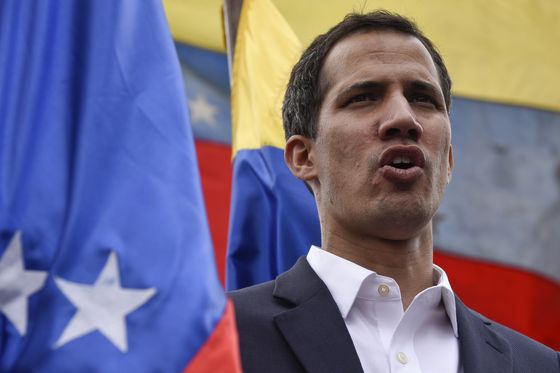 The Trump administration faces a critical test of its Venezuela policy as opposition leader Juan Guaido, bolstered by vocal U.S. support, pressures the country’s military to abandon socialist President Nicolas Maduro and mounts mass protests to force him out.
The Trump administration faces a critical test of its Venezuela policy as opposition leader Juan Guaido, bolstered by vocal U.S. support, pressures the country’s military to abandon socialist President Nicolas Maduro and mounts mass protests to force him out.
In its biggest political and diplomatic intervention in Latin America in years, the U.S. government has rolled out waves of punitive measures against Venezuela, including several rounds of sanctions on its leadership, vital oil sector and banks.
With fewer levers left to pull and protests apparently petering out on Wednesday, President Donald Trump could suffer a setback if Guaido’s latest push fails to ignite a broader uprising against Maduro. Here are Trump’s challenges and remaining options:
GETTING THE MILITARY TO TURN
U.S. officials appeared to have been overly optimistic about quickly sparking a military revolt against Maduro after Washington recognized Guaido as interim president in January. Maduro seems to have retained the loyalty of most officers.
Hawkish national security adviser John Bolton and other Trump aides chafed on Tuesday over what they said was the failure of three senior Maduro loyalists who purportedly had negotiated with the opposition to change sides but then reneged.
Secretary of State Mike Pompeo said Maduro had been expected to flee the country on Tuesday but Russia convinced him to stay. The Kremlin denied this.
Strong doubts remain whether Guaido’s offer of amnesty and U.S. promises to lift sanctions will be enough to spur the military to abandon Maduro in large numbers.
TIGHTENING FINANCIAL NOOSE
The Trump administration has relied more than anything else on sanctions to put bite in its anti-Maduro policy. The sanctions are aimed at choking off cash flow to his government – and more measures are coming, say U.S. officials.
While some of the toughest steps have already been taken, the administration could add to its list of blacklisted Venezuelan banks, companies and individuals – though it is unclear whether this will have significant impact.
It could also act against remaining foreign partners of state oil company PDVSA, using “secondary” sanctions of the type Washington has threatened against foreign companies doing business with Iran.
Potential targets are Spanish oil company Repsol, Russian state oil major Rosneft and India’s Reliance Industries. Such moves, however, would anger their governments.
U.S. MILITARY OPTIONS
Trump and his aides have repeatedly said military options are on the table. But there is deep skepticism whether the president, who is trying to extract the United States from Syria and Afghanistan, is ready for a new foreign conflict.
The Pentagon on Wednesday appeared to downplay any active preparations for military action in Venezuela, but acknowledged detailed contingency planning. Just hours earlier, Pompeo said the United States was prepared to act militarily “if that’s what’s required.”
But U.S. officials continued to emphasize diplomatic and economic pressure as the best way to help oust Maduro.
PRESSURING RUSSIA AND CUBA
The Trump administration has become increasingly critical of Russia and Cuba, accusing them of propping up their staunch ally Maduro. But neither Moscow nor Havana are heeding U.S. warnings.
Pompeo, in a phone call with Russian Foreign Minister Sergei Lavrov on Tuesday, said intervention by Russia is “destabilizing” for U.S.-Russia relations.
Lavrov told Pompeo further “aggressive steps” in Venezuela would be fraught with the gravest consequences, the Russian foreign ministry said.
Russia, which has supplied Venezuela with weapons and loans and recently sent in about a hundred military personnel, says the United States is trying to encourage a coup.
Trump on Tuesday threatened a “full and complete embargo” on Cuba if its Communist leadership did not withdraw security backing for Maduro.
U.S. officials have said Cuba has 20,000 to 25,000 military and intelligence personnel in Venezuela. Cuba has repeatedly denied it has troops in the country.
LOOKING TO 2020 ELECTION
Trump’s handling of Venezuela is one of the few foreign policy initiatives that has won bipartisan support, and what happens in coming months could also have implications for his 2020 re-election bid.
His toughened stance on Cuba and Venezuela has gone down well among Cuban Americans in south Florida, an important voting bloc in a political swing state seen as crucial to his chances of retaining the White House.
However, if Maduro is still firmly in power, it will be hard for Trump to tout Venezuela as a foreign policy success.
REUTERS

Leave a Reply
You must be logged in to post a comment.